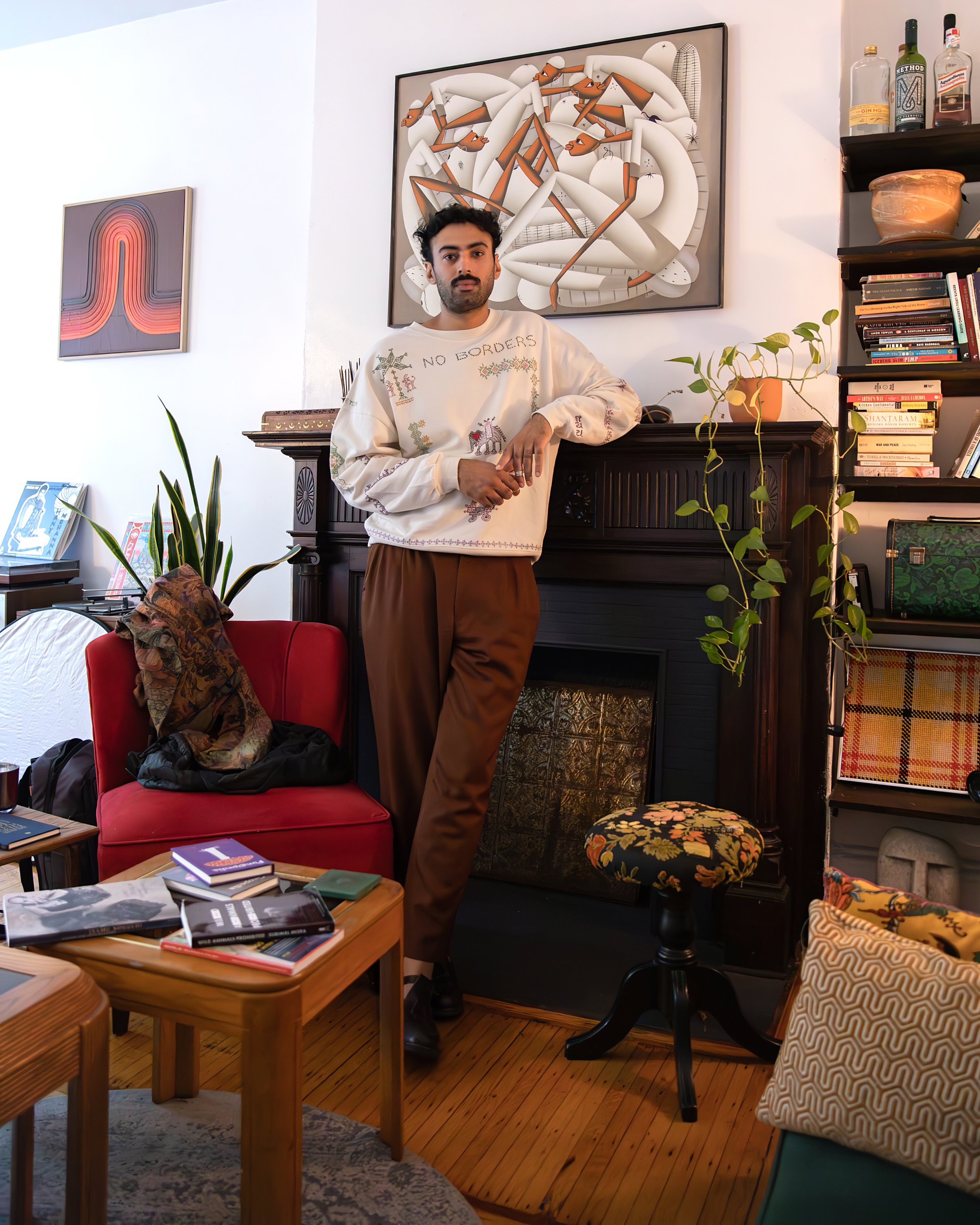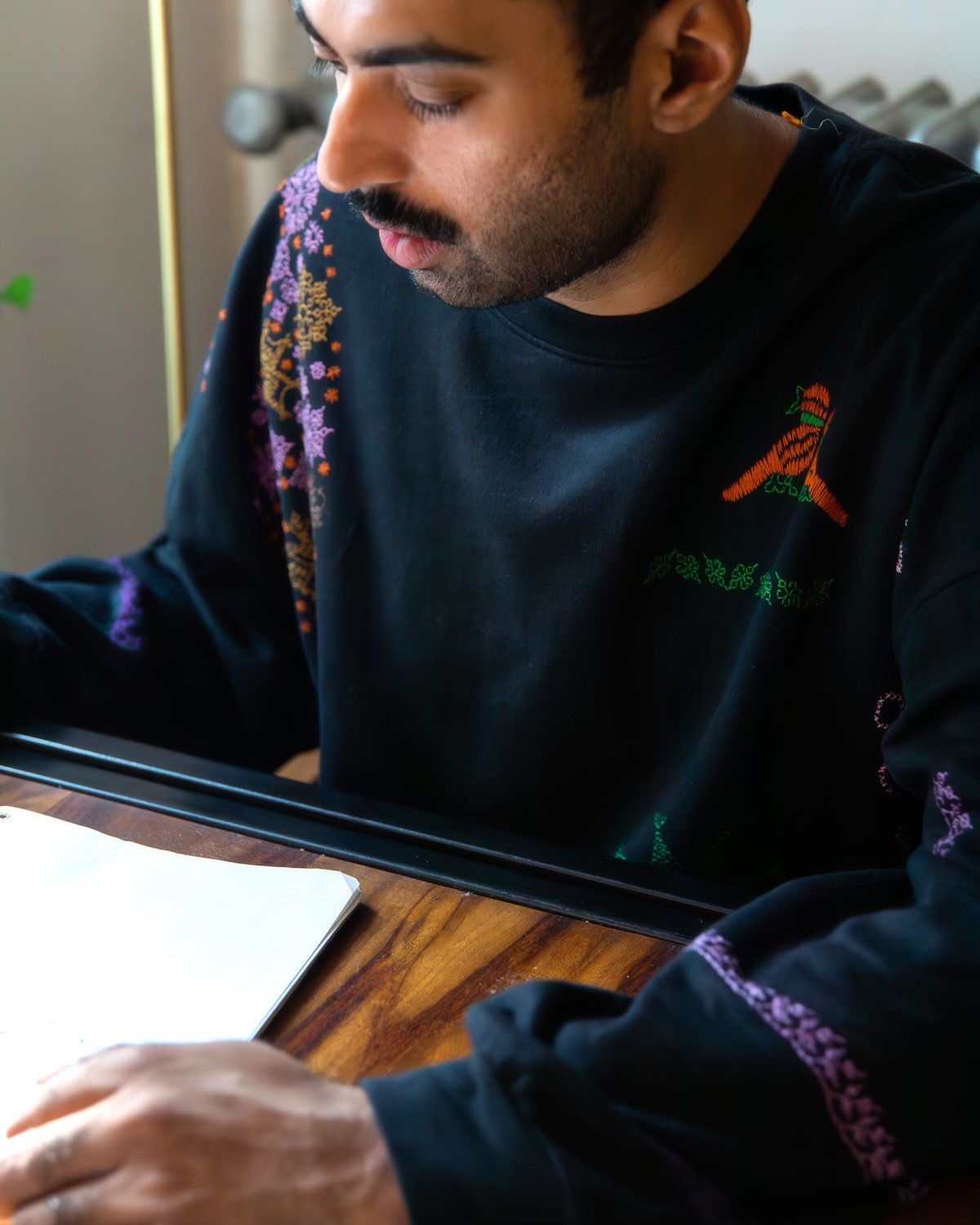A Life of Expression: Alfaaz’s Karan Rathod on Writing, Music, and Weirdness
Creativity was woven into Karan Rathod’s upbringing in Australia. At a young age, he was encouraged to lean into his curiosity, was surrounded by creative people, and had a knack for writing poetically.
A few years ago, Karan made the decision to dedicate most of his time to his creative pursuits and to help others with fulfilling their own. This is how Alfaaz was born: a space for writers and artists to engage in self expression, free from the barriers to entry within creative industries. “As I became more public about my writing, what I learned is that putting your work out there is not accessible. It comes with a lot of caveats, limitations, and arbitrary standards,” he says. Alfaaz began through Karan’s curiosity and appreciation for others’ lives and innerworkings.
On a Sunday morning, Karan spoke to us remotely from his apartment in Brooklyn, New York.
No Borders: Before we get into Alfaaz, can you speak on your background and upbringing?
Karan Rathod: I had a very stimulating upbringing – encouraged to be curious and fulfill that curiosity, and that came from the people I was surrounded by, especially my family.
I was born and raised in Australia. My family trickled in from India over decades, mostly coming in the ‘80s and ‘90s. I had a very strong connection to my culture growing up, but I also grew up in a fairly white area, so I had the common conundrum of being influenced by multiple cultures. My mom is a classical musician and all of her siblings are creatively talented. Multiple times a week, we would be at someone’s house gathering and our evenings would inevitably end in singing, which had later gone on to shape the way I feel about community. Her voice when she sings reminds me of what beautiful expression looks like. My dad still remains the most curious person I know – I owe a lot to inheriting that and being encouraged to entertain my curiosities and I’d say that has been what has driven most of my experiences. My sister, Mancie is a photographer and model and always had a great eye for things, and I observe her a lot, but more than anyone, she’s been my biggest supporter. So I have always been immersed in the arts and surrounded by supportive people.
I’ve always been very connected to and influenced by music. My relationship with different genres and artists has been influenced and evolved over time in a beautiful way. An appreciation for different cultures has always been there, but it's been there much more intimately in the last few years, particularly through poetry and music. I listen to a lot of music and read literature from different countries, and all of that has had a massive influence and impact on my writing. I consider myself a fairly emotional person. I've always said that language is a huge proponent of the way that you feel things. And I think among others, South Asian culture generally is a very expressive and emotional culture with expressive languages to go with it. Channeling that through music has made it a lot easier for me to be able to express myself, understand myself, and feel what I feel.
NB: What is your relationship with creativity?
KR: It's always been around in some form. As I said, my mom is a classical singer and her sister is a painter. I was exposed to it so much that I never really thought of creativity or art as a separate field of life. I just never labeled it as anything. As time went on, I became a lot more intentional about my involvement in the creative space. I also built such a closeness with creativity because it was such a stark contrast to the more corporate work I was doing a couple of years ago, which I am thankful for because having that experience made me understand what really gives me a kick. .
My parents always used to ask me to write birthday cards and I think I just had a knack for words at an early age. I write a lot of poetry and fiction, but I never really characterized my writing as either until I became public about it. For me, it's about storytelling. And I don't really care what the medium is. I usually backwards solve into what I think the right medium is to express what I want to express. And so when I moved to New York, I went to film school to tell stories in a way that felt more multi-dimensional.
I have had this desire to create in ways that are very much connected to education in some form, whether it's to do with writing informative articles, producing infographics about current affairs, or just expressing myself and my knowledge and what I've been learning over the years. I think of expressing yourself as a way of education both for yourself and for others.
It’s rare that I write with intentionality for an audience. It's always been with the intention of experiencing and understanding, and that typically manifests into some sort of a creative output because it is just the way I process, reflect and elaborate on my experiences. So it's been a natural relationship, I'd say. It's never been forced and I want it to always remain that way. I think it's because I love doing it for what it offers me and what I feel from it and it’s also where the most honest stuff comes from.
NB: Let’s talk about Alfaaz. Tell me how it started and what it’s grown into today.
KR: I really respect when people have something to say and what their experiences are. Alfaaz’s unofficial ‘tagline’ and ethos is ‘for one person's words to be the sanctuary of another’ and I really believe that. And so I wanted to create something that allowed people to have that space to express themselves. The interaction of Alfaaz putting someone’s work out, another person telling us how much it impacted them, us sharing that with the writer or artist and then them seeing how their work has impacted people is what fuels us – that interaction is everything.
As we did that, more and more people began to express their desire not only to develop as writers but also to challenge their thinking. We started putting together literary development programs for writers to challenge themselves, and grow as well as build a community. The pool of writers became bigger and bigger.
We get a lot of joy from collaborations. Organizations will come to us to access writers, ideas, and collect words from people and have curated projects and exhibitions touching on specific themes. We did a curation for the United Nations for World Oceans Day in 2023, with the intention of using poetry as an important medium to educate the world on the impact of climate change. We’ve found ourselves naturally doing a lot of cross-medium projects and exhibitions, including in our latest book, Alfaaz: Volume I, which focuses on recreation of poetry by visual artists across different mediums. It reaffirmed how people resonate with different art forms differently and we were proud to be able to do that in this publication.
Alfaaz is changing and growing very naturally by listening to what our community needs. We focus on publishing and showcasing creativity, literary development, creative consulting and to be an organization that provides tools to equip writers and artists to be able to work on and complete projects and grow themselves as people. I think down the track, I wouldn't be surprised if you saw Alfaaz films or music. The whole idea is to allow people to express and be impacted by people's creativity and have the space to do so, no matter the medium.
NB: What does your creative process look like?
KR: It’s very accidental. I rarely set out to create something for the sake of creating it. It typically starts with some sort of stimulus that surrounds me. Being receptive to stimulus is really important, whether that's tiny observations or being really acute of things that are happening, overhearing conversations, personal experiences, emotions, going through what I go through. I really love taking account of things that catch my attention. And that's how it begins.
It’s a misconception that natural creative juices are all it takes to fulfill creative aspirations. After sparking ideas and riding the natural wave of those experiences, the feelings associated with those experiences can sometimes dissipate, so my creative process relies on transportation – putting myself in the mode of that particular setting that got me to start that piece in the first place. That channel, for me, is typically music. I can associate any piece of writing I’m doing with some kind of music. For example, the novel I’m working on is broken up into three scenes and I have a separate playlist for each of those scenes.
A lot of my fiction writing is almost a bit of an excuse for me to learn interesting things and nerd out a little bit. The research process is really fun for me. It makes my writing as accurate and informed as possible, but also allows me to channel the cultural relevance of what I’m writing about. The book that I'm currently working on is a series of short stories that I wrote in ten different jazz cafes and bars in Tokyo, called ’kissas’. Through working on this, I’ve learned about the Johatsu people, how organ donation works in Japan, how to make the perfect Highball, how the Yazuka would function and a bunch of other interesting things.
I also use my writing to channel my weirdness. My family brings out my weirdness the most, and I haven’t lived with them in six years. New York is a really weird place and I think it's a very conducive environment to be weird, but there's a different level of comfort that I have when I’m with my family, and I lost that a little bit. So I use my writing as a way to bring out some of those thoughts, and build on those thoughts, ones that might be, socially, a little bit abstract. Thoughts and ideas that might make sense to me but not others and so I might draw analogies to things that make sense. Allowing myself to be weird is a big part of why I write.
NB: You’ve had a strong creative relationship with us at No Borders. Can you speak on this work?
KR: The biggest influence has been immersion into the culture of No Borders and the atmosphere it manifests. Being around so many talented artists who live and breathe their craft. For Alfaaz, I look to the sense of community No Borders brings - you can see it digitally, but when you see it in person, there’s vibrancy in the community that reminds us of why we do what we do. ❖
Karan wears a Kasuti sweatshirt from our first No Borders in-house collection, A Return to Our Roots.
Photographed by Mary Chen
Styled by Kanika Karvinkop
A poem by Karan Rathod:
Leave me alone in the fall
While I make sense of summer's claims
When my solitude keeps me warmest
And morsels of thought suffice
The leaves too stubborn to turn this year
Holding tight to drying branches
So I climb the Hudson
Where they fall with a little less fear
Leave me alone with the last bits of green
The ones still in denial in November
And so I ask to leave me alone for the winter
When my solitude is even warmer





